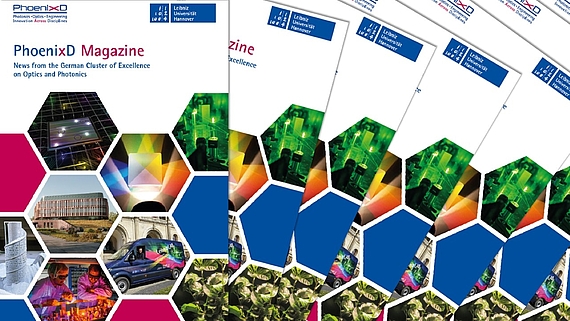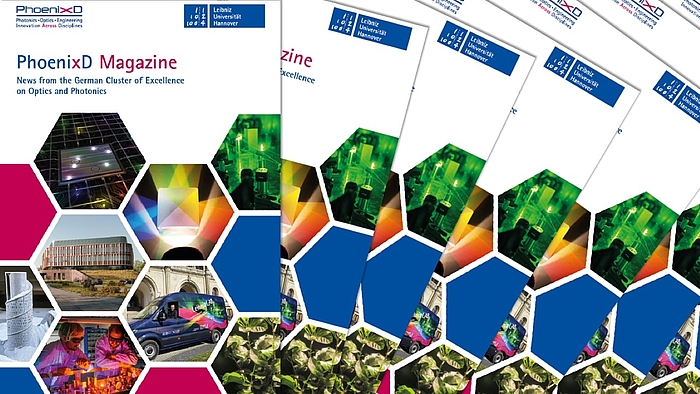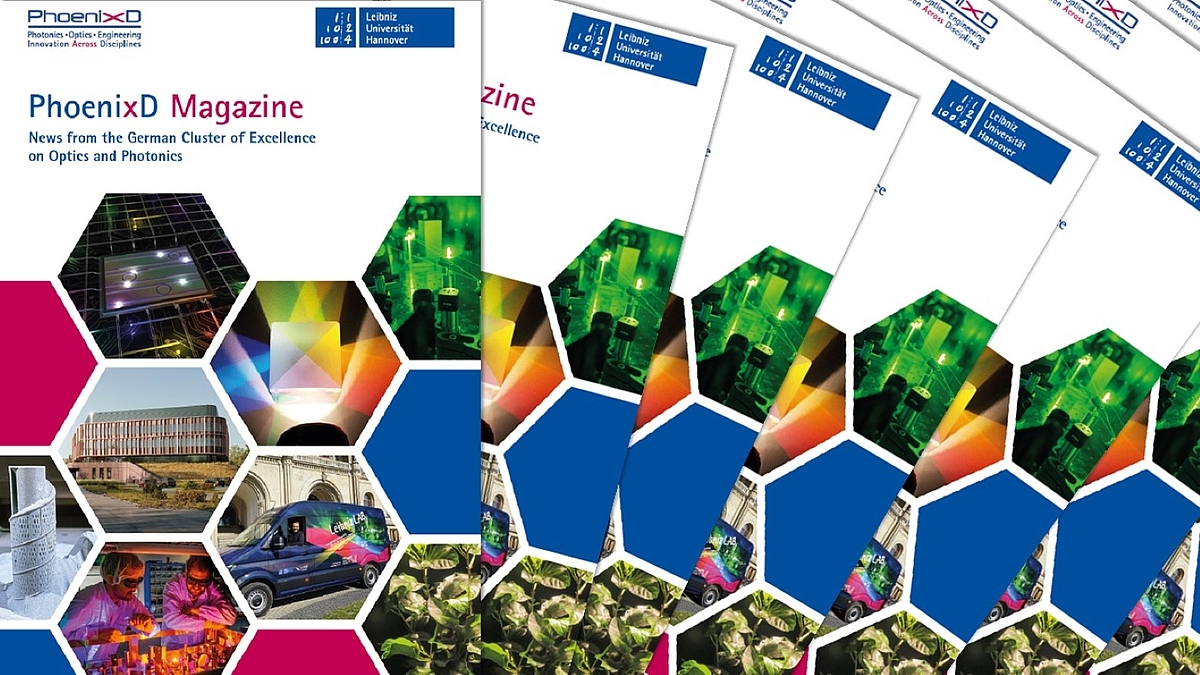Insights into the work of PhoenixD


 ©
PhoenixD
©
PhoenixD
Three and a half years after the launch of the Cluster of Excellence PhoenixD (Photonics, Optics, and Engineering - Innovation Across Disciplines), the more than 120 scientists provide insights into their work: The "PhoenxiD Magazine - News from the German Cluster of Excellence on Optics and Photonics" reports on the research of the Cluster members, the planned OPTICUM - Optics University Center and Campus, and the new bachelor's degree programme. The PhoenixD Executive Board explains its plans and two advisory board members talk about expected further developments of this crucial technology.
Get your PhD with PhoenixD
Click the link “play video” to activate. Please note that activating the video will result in transfer of data to the respective provider. Further information can be found in our privacy policy
Play video
The Cluster of Excellence PhoenixD (Photonics, Optics, and Engineering - Innovation Across Disciplines) with its interdisciplinary network supports young scientists in their doctoral studies in one of the key technologies of the 21st century: optical technologies. During the structured, multi-year PhD programme at PhoenixD Research School, researchers acquire not only specialized knowledge but also job-related key competencies. This qualifies them for a professional career in science as well as in industry. Applications for the PhoenixD Research School are possible at any time of the year without a deadline.
Light: Material, Tool, Pioneer
Click the link “play video” to activate. Please note that activating the video will result in transfer of data to the respective provider. Further information can be found in our privacy policy
Play video
Light is more than just a material. It is also a tool and an essential enabler for numerous digital applications. Whether smartphone cameras, online streaming via optical fibre, laser welding of car bodies and 3D imaging in medicine – optical technologies (light-based technologies) make our everyday digital life possible. During the "November of Science 2021" (#knowember) in Hannover (Germany) three researchers of PhoenixD – Dr. Reinhard Caspary, Dr. Marc-André Dittrich and Dr. Alexander Wolf – held a PhoenixD talk. They explain why developing this technology can only be accomplished with an interdisciplinary approach.
Are you interested in research that will change our future?
Then follow our work on X, Linkedin and Instagram or this page. We regularly inform about our activities, events and research results. You can also subscribe to our Newsletter. You will then receive all relevant information by e-mail. We are looking forward to introduce us to you.
Introducing PhoenixD
In the Cluster of Excellence PhoenixD more than 120 physicists, mechanical engineers, chemists, electrical engineers, computer scientists and mathematicians work together in the field of optical technologies. Photonics is one of the key technologies of our century: Optical glass fibres are the backbone of the Internet and mobile networks. Optical sensors and high-resolution cameras are necessary for autonomous driving, and lasers are replacing the scalpel in medical technology. PhoenixD is exploring the possibilities of digitalization for novel optical systems as well as their production and application.
Click the link “play video” to activate. Please note that activating the video will result in transfer of data to the respective provider. Further information can be found in our privacy policy
Play video
News
Conference “Humboldt meets Leibniz” in Hannover attracts international experts in optics



Over the past two years, due to the coronavirus pandemic, international scientific exchange was only possible to a minimal extent. This also affected networking opportunities for young researchers. From 12 to 14 June 2022, the new conference format “Humboldt meets Leibniz” brings together experts in optics from six continents at Leibniz University Hannover, guided by the motto “Connecting Talents across Generations”. The junior researchers will receive information on career opportunities and present their research. In addition, the public can follow a panel discussion on career paths in science via an online live stream.
Twelve research award winners of the Alexander von Humboldt Foundation from the United States, as well as from France, China, South Africa and Australia will attend the conference. As renowned experts in the field of optics and photonics, they will answer questions of 150 selected junior researchers over the course of two days. “Sharing my passion and experience will hopefully make a difference in the career of a young researcher”, explains Jun Ye, a physics professor from the University of Boulder (United States) who has received many awards for his work.
International researchers visit Hannover
The conference is the first instalment of a new event series developed by Leibniz University Hannover (LUH) in cooperation with the Alexander von Humboldt Foundation and the Volkswagen Foundation in order to increase the international visibility of Hannover as a science location. The conference “Humboldt meets Leibniz” will be held every two years focusing on a different topic each time. Participants include researchers from Australia, Egypt, Brazil, China, India and South Africa. The conference provides information on career opportunities in science, as well as an opportunity to present their research.
“The researchers of Leibniz University Hannover look forward to in-depth exchange with renowned researchers from all over the world within the framework of the conference Humboldt meets Leibniz. For LUH, this is a unique opportunity to present the university as an open-minded and modern science location in order to intensify international collaborations as well as to attract junior researchers”, explains Prof. Dr. Holger Blume, Vice President for Research and Transfer at LUH.
“This meeting enables all participants to network and learn from each other. Especially for young researchers, this is a unique opportunity for direct exchange with internationally renowned award winners of the Humboldt Foundation to benefit from their extensive experience in science and international cooperation”, says Dr. Thomas Hesse, Deputy Secretary General of the Alexander von Humboldt Foundation.
Optical Technologies: From smartphones to medical diagnostics
This year’s networking event is held in cooperation with the Cluster of Excellence “PhoenixD: Photonics, Optics, and Engineering – Innovation across Disciplines”. Therefore, the conference is also part of LUH’s preparations for the next round in the Excellence Strategy. Within the scope of PhoenixD, more than 120 researchers from engineering and natural sciences develop tomorrow’s precision optics. Optical technologies are considered as key technologies of the 21st century. Without them, everyday digital life with smartphone cameras, online streaming via optical glass fibre, laser beam welding of car bodywork or three-dimensional pictures of organs and body layers in medical diagnostics would be impossible.
In recent years, Hannover evolved into one of the most important science locations in the field of optical technologies and gravitational physics. The new research building “OPTICUM – Optics University Center and Campus” worth 54 million euros will be a one-of-a-kind infrastructure for developing complex optical systems and modern manufacturing processes. “Together, we will develop the optics campus in Hannover and establish it as an internationally visible centre of excellence and communication for industry and research partners. We are confident that we will see again many Humboldt meets Leibniz participants at the centre”, says Prof. Dr. Uwe Morgner, spokesperson of the Cluster of Excellence PhoenixD. Just like in research at LUH, interdisciplinary approaches are particularly important in the master''s degree programme “Optical Technologies” and the bachelor''s degree programme “Optical Technologies: Lasers and Photonics”, which prepare students for a career in optics and photonics.
Panel discussion open to media representatives held on campus available via live stream
“Career opportunities, perspectives and challenges in the industry and in science” are central topics of the conference “Humboldt meets Leibniz” and will also be the focus of an international panel discussion. University and business representatives will share their personal experience on Tuesday 14 June 2022, between 10.30 and 12.00 at Herrenhausen Palace (Herrenhäuser Straße 5, 30419 Hannover) and will answer questions of junior researchers.
Panel speakers include:
Prof. Dr. Andrew Forbes (University of the Witwatersrand, South Africa)
Prof. Dr. Naira Hovakimyan (University of Illinois, United States)
Prof. Dr.-Ing. Ludger Overmeyer (Board member of the Cluster of Excellence PhoenixD / Leibniz University Hannover)
Prof. Dr. Anna Lena Giesecke (University of Duisburg-Essen / Fraunhofer IMS)
Dr. Hagen Zimer (TRUMPF Laser GmbH)
Media representatives are welcome to attend the panel discussion. Please register in advance by sending an email to kommunikation@uni-hannover.de.
An online live stream of the panel discussion will be available at: www.uni-hannover.de/livestream/
Note to editors:
For further information, please contact Mechtild Freiin v. Münchhausen,
head of Communications and Marketing and spokesperson of Leibniz University Hannover
(Tel. +49 511 762 -5342, Email kommunikation@uni-hannover.de).















